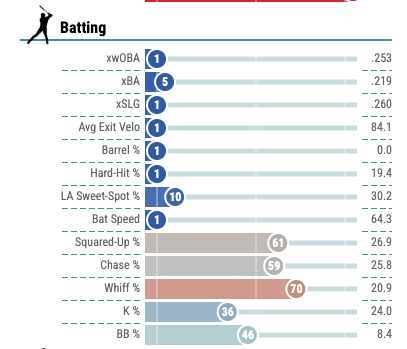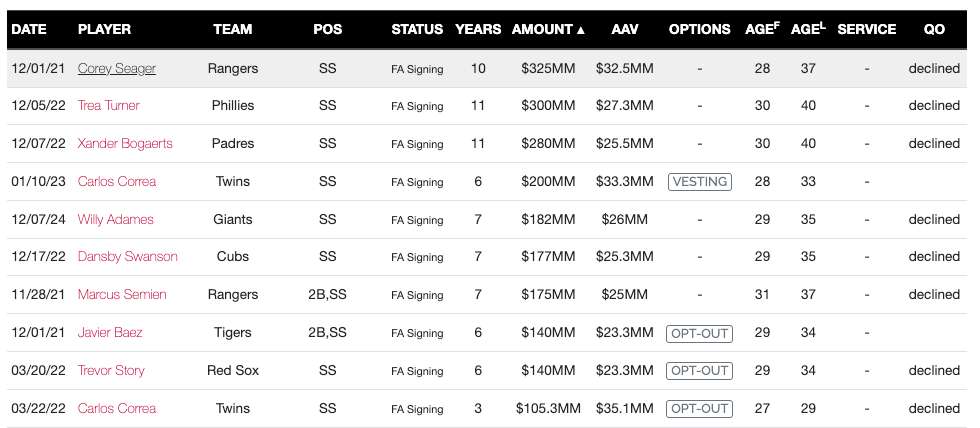What, Exactly, Is Signing Bo Bichette Supposed to Solve?
Atlanta should invest in upside, not overpay for decline years
We’re not fully into offseason mode yet at Braves Today, but we’re starting to look ahead and one of the biggest questions is this: What exactly was Atlanta clearing the CBT penalties for?
There are a lot of potential top-flight free agents on the open market this offseason - while the Braves are probably not in on a $400-plus million deal for outfield slugger Kyle Tucker, there are a lot of top-of-rotation pitching options on the market.
Do you want a lefty workhorse? Framber Valdez is available.
How about bringing home a local boy? Dylan Cease is on the market.
Want to see if you can buy low on a struggling stud? Zac Gallen’s available.
Prefer a lower mileage arm? Michael King’s out there.
There are a lot of Braves fans that want the team to go a different direction, however - shortstop. Bleacher Report’s Kerry Miller wrote a “Way-Too-Early” look at the upcoming free agent class and predicted where some of the biggest names might land. He had Atlanta signing Toronto Blue Jays shortstop Bo Bichette to a six-year, $126M deal.
I think that’d be a mistake. Let’s talk about it.
Why would they go shortstop?
It’s easy to see why the Braves would want to upgrade on incumbent Nick Allen: Offense.
Allen’s hitting .225/.297/.256 entering Tuesday’s game with 28 walks to 80 strikeouts. The lack of power is the most glaring here - of his 66 hits, only nine are for extra-bases, all doubles.
It’s worse than just the lack of homers for the shortstop. Allen’s one of just two qualified hitters, along with speedster Chandler Simpson of the Tampa Bay Rays, without a single barrel on the year. Of the 221 balls that Allen’s put into play, only eleven are even 100 miles per hour or more and his season high exit velocity is just 104.4.
It’s admittedly an ugly top-half of the Statcast card for Allen - a LOT of blue, with Allen among the worst in the league in several categories. Even though he doesn’t whiff excessively, it’s not helping him avoid striking out more than league average.
Bichette, by contrast, can bring the lumber. The 2016 2nd rounder has a career .291/.333/.467 line with 108 homers and has twice led the American League in hits (191 in 2021 and 189 in 2022). He currently leads all of baseball with 141 hits and 471 at-bats in 2025, usually working as a leadoff hitter for Toronto.
On the surface, making the swap makes sense…but I think it’d be a mistake.
How susceptible is this profile to aging?
One of my personal theories that I’ve been knocking around for a while is the “high contact rate at the expense of everything else” offensive profile is one of the most vulnerable to aging curves of any in baseball.
There are a ton of examples of high-contact hitters having a precipitous fall, but there are two notable warning signs if you’re thinking about signing Bo Bichette: Tim Anderson and Luis Arraez.
Tim Anderson won the AL Batting Title in 2019, hitting .335/.357/.508. But by 2023, he was a negative-WAR player and is currently a free agent after being released by the Angels in May. He hit just .205 in his age-32 season, plagued by chasing and a lack of walks.
Arraez is going to be a fascinating free agency case this winter. Winning three consecutive batting titles from 2022-2024, he’s hitting .296/.332/.404 for the Padres but has been traded away by two different clubs in his seven-year career despite his contact prowess. Statcast actually grades him as worth -4 Batting Run Value this season, despite the high average, owing to a lack of power, poor walk rates, and having a below-average chase rate.
Bo Bichette doesn’t walk much — his career walk rate is 5.5%, compared to a league average of 8.4% — and he chases significantly more than average (career 36.8% chase rate vs 28.4%). See where I’m going with this?
While Bichette does have better power than either Arraez or Anderson, it’s still not the primary facet of his game. He’s a contact and average guy, albeit one with three 20+ homer seasons during the throes of MLB’s juiced ball era of 2021-2023. He currently has fifteen homers on the season in his first 503 plate appearances, so another 20-homer season is still within reach.
I’m not convinced that Bichette isn’t the next Anderson, albeit one that should be able to last a few more seasons than Anderson’s nine.
The defensive downgrade is enormous
The other factor that all of those contact batsmen I mentioned above have in common is that they are not good defenders. They have been, at points in their careers - Tim Anderson was worth +2 Fielding Run Value as recently as 2021 and holds a +9 for his entire career - but aren’t considered quality defenders at their positions as they hit their early 30s.
Bichette’s one of the most obvious position-change candidates in this year’s free agent class. His -4 FRV is only 16th percentile and ranks 26th out of 29 qualified shortstops. And this isn’t a one-year blip — he’s posted negative FRV totals in multiple seasons, including a -5
This isn’t a one-year blip, either, like what Willy Adames dealt with in his walk year with the Brewers last season. Bichette’s best season is just +1 FRV, while he has two -4 FRV campaigns and a -5 FRV on his ledger (and as he has only 900 innings this season at shortstop, there’s still time for this -4 to get even worse).
Nick Allen, by contrast, is at +13 FRV, just one run behind cannon-armed Masyn Winn of the St. Louis Cardinals for the best mark in baseball.
For a Braves team that prioritizes defense up the middle at catcher, shortstop, and centerfield, voluntarily going from one of the league’s best defenders to one of the worst seems to be a choice that the Braves aren’t going to be willing to make.
I can hear some Bo Bichette fans now: ‘Well, move him to second base.’ Okay - let’s talk about the contract.
Not a great way to get value
The Bleacher Report article projected six years and $126M for Bichette, while the linked Spotrac Market Value calculation was seven years and $148M.
$21M per year fits in with Atlanta’s reluctance to extend past $22M per year on long-term contracts. No Braves player - not Austin Riley, Matt Olson, or Spencer Strider - are making more than $22M in any season of their long-term extensions.
But is it enough to land Bichette? As with last year’s free agent class at the position, it’s incredibly shallow. The next best option behind Bichette is either Chicago Cubs deadline acquisition Willi Castro, a utilityman with only 134 starts (and a career -4 Outs Above Average) at short or offensively-challenged veterans Miguel Rojas and Isiah Kiner-Falefa.
I guess Orlando Arcia’s available, technically, so problem solved.
In those situations, someone desperate is always willing to either promise to play him at shortstop or meet his financial demands.
And shortstops always get paid. Here’s a partial list of recent shortstop free agent deals, almost universally for longer and a higher AAV than would be recommended in a vacuum.
While most of these free agents are more complete players than Bichette, as they’re mostly competent defenders, several of them were also grouped in the same free agent class and still got $25M+ AAVs.
I’m saying I don’t expect Bo Bichette to sign for $21M AAV or less to play second base.
And really, the problem with the offense isn’t Nick Allen’s .553 OPS. That’s not helping, mind you, but the real problem is everyone else. Matt Olson having only 18 homers in 111 games. Ozzie Albies hitting just .226 with a .632 OPS. Michael Harris II with a career-worst offensive performance. Austin Riley hitting like it’s 2024 and not like it’s 2021 or 2022.
If the rest of the offense is hitting ‘like the back of their baseball cards’, to borrow a phrase of manager Brian Snitker’s, then you can live with Nick Allen’s pedestrian bat at shortstop because he’s an awesome defender.
But is it worth trading a league-minimum salary and elite defense for an empty .300 average at shortstop? When you factor in that next season is likely the first of six or seven seasons you’d be signing up for that, it’s clear that no, it’s not.





Braves have 4 holes in their line-up right now; 2B, SS, LF and CF. I doubt we can fix/buy our way out of all 4 problems, and there is no help in MiLB. Two of those positions at least are manned by well above average defenders (SS and CF).
It sure makes sense to me, if we can't fix all 4 problems, to fix the ones where we are below average as hitters and fielders.
Signing Bichette smacks of desperation. Akin to the Profar move. We probably would been better off sticking Eli out there or giving Laureano a 2 year deal versus giving Profar the bag after a late career breakout
Harris. We probably roll with him. Not buying the offensive uptick completely. The last time I looked the chase rate was still bad.
The OF next year will be Acuna, Harris, Profar and White. Just don't see major money being invested there. Lane Thomas is a FA. Braves have had interest in the past so maybe they kick the tires there and move Profar.
Doubt we do anything significant with 2b either.
As for SS: Your options on the roster are Allen, Eli and Lodise. Maybe you give Lodise a week of games in September and see how he handles it.
Believe Ha Seong Kim has an opt out so maybe a FA. If DBacks start over maybe Perdomo. Tovar is another option.
A frontline P makes sense. Don't see us in a bidding war for Cease. Also think he is a Boras client.
Ranger Suarez or Framber Valdez maybe.